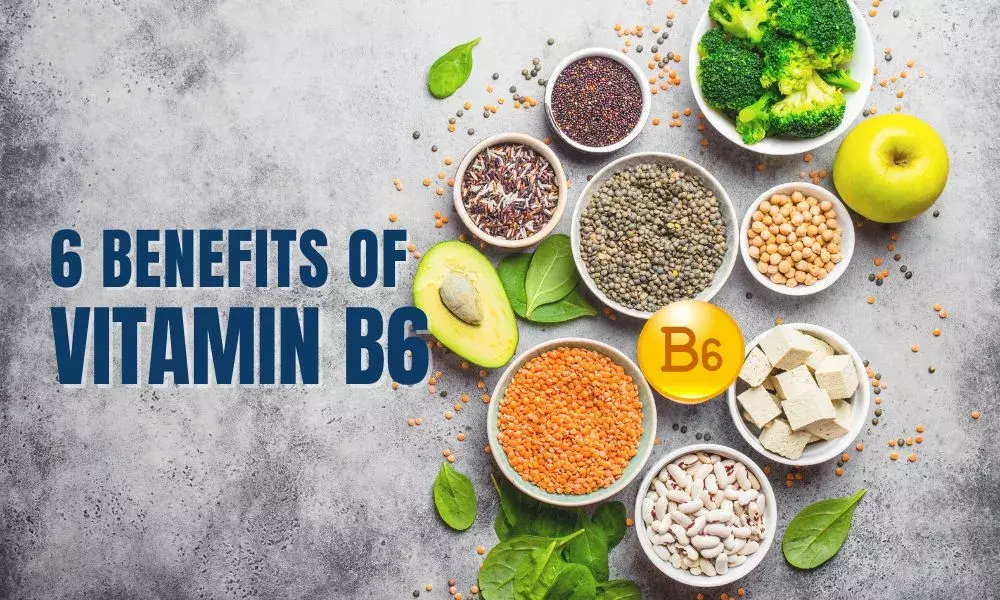This Vitamin can protect your heart, improve your mood and prevent anaemia.
Table of content
-
What is Vitamin B6?
-
Benefits of Vitamin B6
-
How much Vitamin B6 is required?
-
Vitamin B6 Sources
What is Vitamin B6?
Vitamin B6 belongs to the B Vitamin group and is essential for our cells to function properly. It aids in metabolism, keeps the cells healthy, and helps create blood cells.
It is Also known as pyridoxine and is a water-soluble vitamin. Our body does not store vitamin B6 and releases an excess amount through urine, so one needs to get enough vitamin B6 daily. The best way to maintain a healthy level of vitamin B6 is through a balanced diet.
Vitamin B6 plays many crucial roles in the functioning of our body, a few of the important roles are:
-
It helps the body to metabolize fats, proteins and carbohydrates to generate energy.
-
Aids in immune system functioning.
-
Creates neurotransmitters, including serotonin and dopamine.
-
Helps in brain development during pregnancy and infancy.
-
It helps in creating haemoglobin (red blood cells that carries oxygen).
Benefits of Vitamin B6
-
Improves Mood:
Vitamin B6 plays a vital role in producing neurotransmitters like serotonin. This chemical helps regulate mood and aids sleep. People with enough levels of Vitamin B6 are least likely to experience anxiety disorders and depression.
-
Good for Heart Health:
Vitamin B6 helps our body maintain normal levels of homocysteine. It is an amino acid that helps to build proteins. Higher levels of homocysteine can lead to blood clots or blood vessel blockages, which can be dangerous for our heart health. The presence of sufficient levels of Vitamin B6 regulates the levels of homocysteine.
-
Prevents Anaemia:
Vitamin B6 helps produce red blood cells. It helps treat conditions like sideroblastic anaemia, a rare genetic disorder that affects how the body produces red blood cells.
-
Promotes Brain Health:
Vitamin B6 is essential for our brain health because it helps create neurotransmitters. A deficiency of vitamins B6 and B12 is associated with reduced brain function.
-
Eases Nausea during Pregnancy
This essential nutrient is vital during pregnancy. It not only ensures healthy pregnancy but aids in reducing excessive nausea during pregnancy and is suitable for women’s Health.
-
Reduces risk of Chronic diseases
Vitamin B6 plays a primary role in our cells’ healthy growth and development. A deficiency of this Vitamin is associated with the development of chronic illnesses such as rheumatoid arthritis.
How much Vitamin B6 is required?
Vitamin B6 is crucial for our Health. But too much of this Vitamin may be harmful. The upper limit of Vitamin B6 is 100mg per day for an adult and it differs across the age groups. Higher levels of Vitamin B6 can cause nausea, heartburn, and sensitivity to sunlight. In certain advanced cases, it may also cause loss of control over body movements, nerve damage, and numbness in your hands or feet. It is, therefore, essential to consult a doctor before taking Vitamin B6 supplements.
Vitamin B6 Sources
Food is a good and healthier option to obtain Vitamin B6. You may consult a nutritionist to get a tailor-made diet that includes essential nutrients, including Vitamin B6. Additionally, there are specific sources of food rich in Vitamin B6.
Fruits and vegetables: Plant-based foods rich in vitamin B6 include sweet potatoes and potatoes, avocado, bananas, green peas, carrots, spinach, tofu, and nuts. Chickpeas and tofu are also good sources of Vitamin B6.
Dairy Products: Cottage cheese is considered rich in Vitamin B6. Further, any type of cheese containing whey is also a good source of Vitamin B6.
Meat: Red meat, Chicken liver, and beef liver products are also excellent sources of B6.
Sea Food: Tuna is regarded as one of the richest sources of Vitamin B6. Sockeye salmon is also loaded with B6 and is another excellent option for Vitamin B6 at the seafood counter.
In a nutshell, Vitamin B6 is essential nutrient required for smooth functioning of our body, therefore ensure that your Vitamin B6 levels are sufficient.





